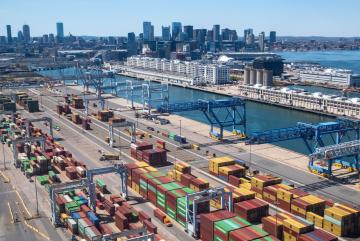
MIT News Office
|
Report: Sustainability in supply chains is still a firm-level priority
Analysis from MIT’s Center for Transportation and Logistics finds companies are still acting to reduce emissions, but often lag in measurement techniques.
MIT News Office
|
Secretary of Energy Chris Wright ’85 visits MIT
Panel discussions focused on innovation in many forms of energy, then a tour of campus featured student research.
MIT News Office
|
MIT OpenCourseWare is “a living testament to the nobility of open, unbounded learning”
For physicist Mostafa Fawzy, MIT Open Learning’s OpenCourseWare was a steadfast companion through countless study sessions.
MIT News Office
|
Concrete “battery” developed at MIT now packs 10 times the power
Improved carbon-cement supercapacitors could turn the concrete around us into massive energy storage systems.
MIT News Office
|
Responding to the climate impact of generative AI
Explosive growth of AI data centers is expected to increase greenhouse gas emissions. Researchers are now seeking solutions to reduce these environmental harms.
MIT News Office
|
3 Questions: Addressing the world’s most pressing challenges
Mihaela Papa discusses the BRICS Lab, her role at the Center for International Studies, and the center's ongoing ambition to tackle the world's most complex challenges in new and creative ways.
MIT News Office
|
A beacon of light
A lantern created in the Design Intelligence Lab creates sustainable alternatives for consumer electronics.
MIT News Office
|
MIT’s work with Idaho National Laboratory advances America’s nuclear industry
The collaboration has led to new fuels and a variety of other projects to enable clean, safe nuclear energy.
MIT News Office
|
Q&A: David Whelihan on the challenges of operating in the Arctic
How do you access and conduct research in one of the world's harshest and most demanding environments?










